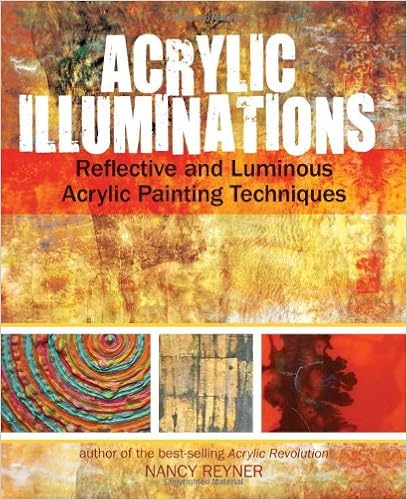Acrylic Illuminations: Reflective and Luminous Acrylic Painting Techniques - Nancy Reyner - [EPUB][N27]seeders: 17
leechers: 3
Acrylic Illuminations: Reflective and Luminous Acrylic Painting Techniques - Nancy Reyner - [EPUB][N27] (Size: 28.32 MB)
Description Acrylic Illuminations: Reflective and Luminous Acrylic Painting Techniques by Nancy Reyner Language: English | Format: EPUB | ISBN-10: 1440327033 | ISBN-13: 978-1440327032 Page count: 144 | Date Published: December 13, 2013 | Publisher: North Light Books  Arts & Photography, Painting, Acrylics CONTENTS Special Offers Introduction About This Book Crash Course on Acrylic Your Acrylic Toolbox Pigment/Color Acrylic Binders: Mediums, Gels and Pastes Inventing With Your Toolbox Application Tips and Materials Distinctive Metallics Essential Tips for Metallics Basic application of gold leaf Mixing Metal Leaf Textured Metal Sanding Metal Leaf High Gloss Leaf Gold Leaf Backgrounds Intensify Metallic Hues Decorative Designs Subtractive Glazing Tarnish Effects Faux Leaf Patinas Drawing on Leaf Glitter and Metal Flakes Metal Paint Prismatic Effects Essential Tips for Reflective Paints Multicolor Imprint Veiling Layers with Pastes Matte Skins Construction Soft Melted Effects Multiple Layering Fake Wax Underglow Effects Overglow Sheens Prismatic Layering Embedded Pearlized Color Secret Tricks to Pouring Essential Tips for Pouring Surfboard Finish Dirty-Mix Pours The Supreme Pour Smoothing Pours Poured Glazing Deep Pouring Embedding Objects Pouring Veiled Effects Halo Staining Metallic Rainbow Color Field Staining Marbleizing Color Fields Shaped Edge Washes Hard and Soft Edge Pouring Optical & Luminous Effects Essential Tips for Optical and Luminous Effects The Paint as Itself Polished “Stone” Effects Sheen Shifting Subtractive Metallic Grisaille Metallic Drawing Surfaces Stained Glass Effect Veiling Metal Leaf Glass Refraction Pouring Embedded Leaf Fluorescent and Phosphorescent Paints Vibrating Optical Effects High Contrast Contributing Artists About the Author Dedication Acknowledgments Copyright Excerpt: There are plenty of scientific articles on this topic; however, for simplicity we can organize artist paint colors into three main categories based on their pigments: mineral (also called inorganic), modern (also called organic) and reflective (iridescent and interference paints). The pigments in the mineral category, as well as the reflective categories, contain both natural and synthetic pigments, while pigments in the modern category are all synthetic. Modern paints tend to have new-sounding names like Phthalo and Quinacridone, while mineral paints usually have familiar-sounding names like Ochre, Cadmium and Burnt Sienna. If you could see pigment particles in a microscope, the pigments in the mineral category look like dusty boulders while the modern ones resemble pieces of stained glass. Mineral colors have a consistent hue whether applied thinly (to reveal its undertone) or thickly (to create its masstone), offer more opaque coverage, apply evenly with a brush, and dry to a matte sheen. Modern colors are opaque and darker in hue when applied thickly, while super bright and transparent when used thinly. Modern colors appear streaky when brush applied due to this dramatic visual difference between thick and thin applications and dry glossy. Some other differences include tinting strengths. Minerals get immediately dull and chalky when white is added, while moderns “pop” or get intensely brighter with a small amount of white. When mixing colors, moderns are “cleaner” and don’t turn muddy as fast as minerals. Moderns are powerful color mixers that strongly affect the resulting color when added to a mixture. Reflective paints reflect light and refract color. These unique pigments have their own special set of guidelines covered in more detail in Section 3: Essential Tips for Reflective Paints.  Sharing Widget |